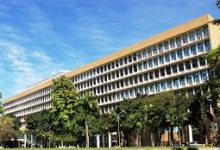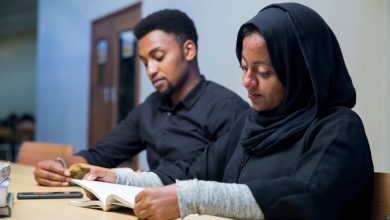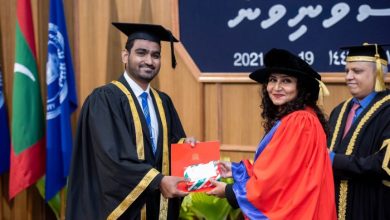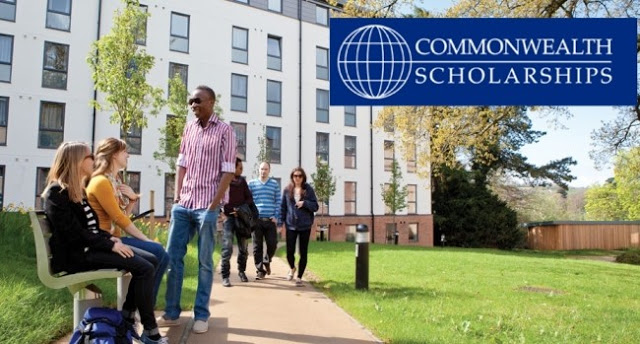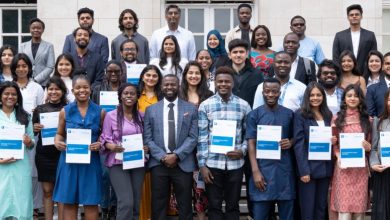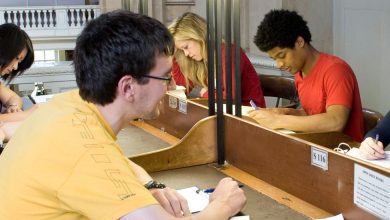Fully Funded Scholarships For Students With Hearing Impairment 2024/2025
Living with hearing impairment presents unique challenges in daily life, let alone pursuing higher education. But there’s good news: there are fully funded scholarships available specifically for students with hearing impairment.
They not only provide financial support but also foster a community of inclusion and empowerment. In this blog, we’ll explore some of these scholarships and the opportunities they offer.
AG Bell College Scholarship Program
The AG Bell College Scholarship Program is a fantastic opportunity provided by the Alexander Graham Bell Association for the Deaf and Hard of Hearing. Designed for students diagnosed with bilateral hearing loss before their fourth birthday, this scholarship opens doors for them to be a part of the mainstream university system.
Eligibility:
- Be a US citizen or permanent resident.
- Have a pre-lingual, bilateral hearing loss classified as moderate to severe.
- Use listening and spoken language as your primary method of communication.
- Be enrolled full-time in an accredited undergraduate or graduate program in the US.
- Have a minimum GPA of 3.25 for undergraduate applicants and 3.0 for graduate applicants.
- Demonstrate active involvement in community service and/or extracurricular activities.
Scholarship Awards:
- The program awards scholarships ranging from $2,500 to $10,000 annually.
- Awards are non-renewable, but students who remain eligible can reapply in subsequent years.
Application Process:
- The application period typically opens in October and closes in February each year.
- Applications are submitted online through the AG Bell website.
- Required materials include transcripts, a personal statement, letters of recommendation, and proof of diagnosis and financial need.
Students should be prepared for an intensive application process that includes an essay and letters of recommendation. But rest assured, the journey is well worth the benefits and opportunities that await at the other end.
Sertoma Scholarship for the Deaf or Hard of Hearing
The Sertoma Scholarship for the Deaf or Hard of Hearing is another fantastic opportunity for students living with hearing impairment. Offered by Sertoma, a notable service organization dedicated to improving the quality of life for those impacted by hearing loss, this scholarship is specifically designed to assist students to hurdle the financial obstacles that might be standing between them and their higher education dreams.
Eligibility:
- Be a citizen of the United States of America.
- Have a clinically significant bilateral hearing loss, evidenced by an SRT or PTA of 40dB or greater in both ears (audiogram required).
- Be graduating from high school or currently enrolled as an undergraduate student pursuing a bachelor’s degree full-time at an accredited college or university in the US (graduate degrees, associate degrees, community colleges, and vocational programs do not qualify).
- Maintain a minimum cumulative GPA of 3.2 on a 4.0 un-weighted scale (high school seniors use GPA for grades 9-11 and first semester of grade 12; college freshmen use GPA for all of high school and first semester of college).
Award:
- Each awardee receives a one-time scholarship of $1,000.
- The scholarship can be used to cover tuition, books, and other educational expenses during the awarded academic year.
Application Process:
- The application typically opens in October and closes on March 31st annually.
- Applications are submitted online through the Scholarship America website: https://apply.mykaleidoscope.com/scholarships/ScholarshipforStudentsWhoAreHardOfHearingOrDeaf2024
- Required materials include transcripts, a personal statement, letters of recommendation, proof of diagnosis and financial need, and documentation of participation in activities related to deafness or hard of hearing.
To apply for the Sertoma Scholarship for the Deaf or Hard of Hearing, students are required to meet all necessary qualifications and complete an application process. This investment of time and effort could well be the gateway to securing financial aid for your higher education journey.
The Minnie Pearl Scholarship
The Minnie Pearl Scholarship is a tribute to the memory of a legendary figure in the country music world who experienced significant hearing loss. Managed by the EAR Foundation, this scholarship provides financial assistance to students with hearing impairment who are aiming to pursue a four-year undergraduate degree.
Eligibility:
- Be a high school senior in the United States with a minimum GPA of 3.0.
- Have a severe to profound bilateral hearing loss (defined as an average of 70 dB or greater in both ears).
- Plan to attend a full-time undergraduate program at an accredited college or university in the United States.
- Be a citizen of the United States or a permanent resident.
Award:
- The scholarship amount is $2,500 per year for up to four years of undergraduate study, for a total of $10,000.
- The scholarship is renewable each year if the recipient maintains a minimum GPA of 3.0 and continues to meet the eligibility requirements.
Application Process:
- The application period typically opens in October and closes in February each year.
- Applications are submitted online through the Tennessee School for the Deaf website: [[https www tnsd k12 tn us scholarships minnie pearl scholarship ON Tennessee School for the Deaf]]
- Required materials include transcripts, a personal statement, letters of recommendation, and proof of hearing loss.
This effort could be a stepping stone towards securing valuable financial assistance for your university journey, all while honoring the legacy of a country music icon and advocate for those with hearing loss.
National Technical Institute for the Deaf (NTID) Scholarships
The National Technical Institute for the Deaf (NTID), a prestigious institution under the umbrella of the Rochester Institute of Technology, is yet another beacon of hope for students with hearing impairment. Recognizing the potential of these students, NTID offers a plethora of scholarships tailored to their unique needs and ambitions.
Types of Scholarships:
- NTID Merit Scholarships: Awarded to incoming first-year students based on academic achievement, extracurricular activities, and leadership potential.
- NTID Need-Based Scholarships: Awarded to students with demonstrated financial need.
- Endowed Scholarships: Funded by individuals, corporations, and foundations, these scholarships support students with specific interests or backgrounds.
- External Scholarships: There are many scholarships available from other organizations that students with hearing loss may be eligible for.
Scholarship Amounts:
Scholarship amounts vary depending on the type of scholarship and the student’s financial need. Some scholarships cover the full cost of tuition, while others provide a partial award.
Eligibility:
To be eligible for most NTID scholarships, you must be:
- A deaf or hard-of-hearing student
- A U.S. citizen or permanent resident
- Enrolled in a full-time program at NTID
How to Apply:
You can apply for NTID scholarships by completing the Free Application for Federal Student Aid (FAFSA) and the NTID scholarship application. The FAFSA is used to determine your eligibility for federal and state financial aid, while the NTID scholarship application allows you to be considered for all of the scholarships offered by NTID.
So, if you’re a student with a hearing impairment looking to hone your technical skills or explore your passion in a diverse field, the NTID scholarships could be your ticket to an empowering education. Remember, it’s not just about the financial aid; it’s about seizing an opportunity to thrive in an inclusive and supportive academic environment.
Read Also: Fully Funded Zambia Scholarships
FAQS
Is hearing loss a disability?
Yes, hearing loss can be considered a disability under certain legal definitions. Depending on the severity and impact on daily life, it may qualify for protection under the Americans with Disabilities Act (ADA) and similar legislation. This ensures equal access to opportunities and accommodations in various settings.
How much hearing loss is considered deaf?
“Deaf” is a spectrum, not a single point. Deafness is usually defined as an average hearing loss of 70 decibels (dB) or greater in both ears across various frequencies. However, individuals with different levels of hearing loss experience challenges, communication preferences, and cultural identities associated with being deaf.
What support is available for hearing loss?
Several forms of support exist for people with hearing loss:
- Hearing aids and assistive devices: Amplify sound and improve communication.
- Cochlear implants: Surgically implanted devices for severe to profound hearing loss.
- Sign language: Visual communication method used by many deaf communities.
- Captioning and other visual communication tools: Enhance understanding of spoken language.
- Counseling and support groups: Help individuals and families adjust to hearing loss.
- Educational resources and advocacy: Information and support for navigating life with hearing loss.
How much can a deaf person hear with a hearing aid?
Hearing aids don’t “restore” hearing to normal. They amplify sounds, and their effectiveness varies depending on individual needs and the specific technology. Some may perceive speech more clearly, while others experience improved awareness of environmental sounds.
At what level of hearing loss do you need a hearing aid?
There’s no single threshold. Decisions depend on your individual concerns, lifestyle, and communication needs. Mild hearing loss might not necessarily require hearing aids, while some people with moderate loss find them beneficial. Consulting an audiologist is crucial for personalized evaluation and recommendations.
Conclusion
The journey towards higher education can seem daunting, particularly for students with hearing impairment. Yet, the landscape is gradually shifting, becoming more inclusive and accessible with the support of these dedicated scholarship programs. They not only offer much-needed financial assistance but also create a supportive and empowering community for these students.
Finally, it is essential to remember that these are just a few of the scholarships available. There are numerous other financial aid opportunities out there, each designed to help students with hearing impairment overcome financial barriers to education. So, whether you dream of becoming an engineer, a scientist, an artist, or a business tycoon, rest assured, there is a scholarship out there waiting for you. In the end, these scholarships are not just about funding education; they are about creating an equal opportunity for every student to excel, regardless of their hearing ability.


